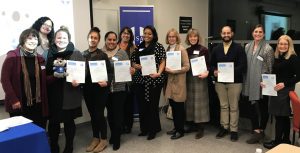NECC Faculty and Staff Complete National Mental Health First Aid® Training

This group graduated from the Mental Health First Aid Program pre-COVID. Since the pandemic, the program has been offered online.
Recognizing that many college students suffer from anxiety and depression, Northern Essex Community College is working proactively to help identify these students and connect them with help.
In the two years it’s been offered at the college, 130 members of the faculty and staff have completed the national Mental Health First Aid® (MHFA) certification training through the college’s Center for Professional Development.
The eight-hour training course teaches how to identify, understand, and respond to signs of mental illness and substance abuse disorders. After completing the course and two-hours of self-paced work, participants can take a test and become certified as Mental Health First Aiders.
“Just as CPR helps those without medical training to assist an individual having a heart attack, MHFA prepares participants to help someone developing a mental health problem or experiencing a mental health crisis,” says Kim Burns, dean of academic innovations and professional development.”
At Northern Essex, the course is taught by Behavioral Science and Human Services Professor Kathleen Bartolini, who transitioned to teaching after a 20-year career as a child and adolescent psychotherapist. The Center for Professional Development offers the course throughout the year and the next one is on June 29.
“As part of this course, we are going to have the hard conversations; you’re going to know what to do next,” Bartolini explains. “I’m not giving out capes, but having this certification, you can identify the problem, and know when it’s important to step in.”
Individuals enrolled in the program will grow their knowledge of signs, symptoms, and risk factors of mental illnesses and addictions; be able to identify multiple types of professional and self-help resources for individuals with a mental illness or addiction; and increase their confidence in helping an individual in distress.
“If someone is struggling with a broken bone or physical illness, we tend to know what to say,” says Bartolini. “But not with mental health issues. People are afraid of saying the wrong thing so they don’t say anything.”
While the course was offered before the pandemic struck in March of 2020, COVID has become part of the conversation, says Bartolini. “A lot of people have asked how to help students as well as family and friends to manage the anxiety from COVID.”
Mental health isn’t only an issue on college campuses. According to statistics provided by the National Council for Mental Wellbeing, 123 people die by suicide each day and nearly 1 in 5 U.S. adults lives with a mental illness.
“I am thrilled that I get to work for an institution that sees the importance of being educated about mental health issues,” says Bartolini.
To learn more, contact Bartolini at kbartolini@necc.mass.edu or Sharon McManus, Center for Professional Development, smcmanus@necc.mass.edu.






